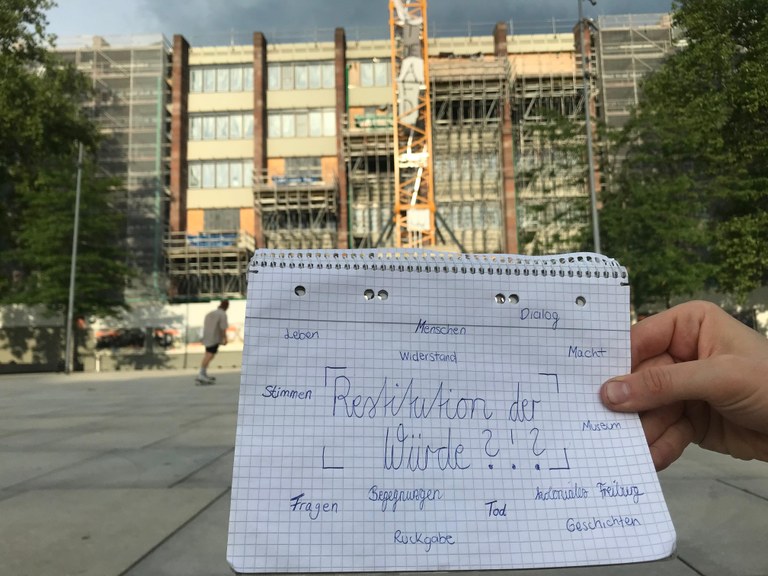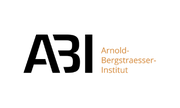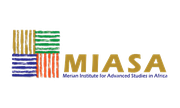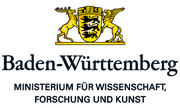Experimental Artistic Research: Of Ears of the Dead and Voices of the Living
| When |
Jul 15, 2024 03:30 PM
to
Jul 18, 2024 04:00 PM |
|---|---|
| Where | Platz der Alten Synagoge, Freiburg |
| Add event to calendar |
|

The University of Freiburg is home to the Alexander Ecker Collection, one of the largest and oldest anthropological collections in the German-speaking world. Due to problematic acquisition practices in various countries, demands are now being made for the return of certain subjects (as "objects") in the depot. Looking at practices during the German colonial period on the African continent (1884-1918), it becomes clear that ancestral remains are unlawfully in the possession of German universities and museums.
This project deals specifically with five skulls of Maka individuals that came to Freiburg from Cameroon in 1907 through Hans Dominik, a feared officer of the imperial "Schutztruppe", and Prof. Carl Albert Haberer. Based on forensic and archival investigations, it must be assumed that physical violence led to the deaths of the five Maka - very much in the sense of what we know of "punitive expeditions" from the colonial era. The equally infamous curator Eugen Fischer integrated these ancestral remains into the university's existing "collection" and completely dehumanized them.
These five individuals now become the starting point for important and profound questions. Cultural artifacts looted during the colonial era, and even more so "human remains" in camps, raise debates about:
- What kind of science do we want?
- What are or could be the demands of families/communities in terms of
- restitution, apology, restorative justice?
- What does all this have to do with "us" today?
We extend the discussions between scholars to the public space and create opportunities for encounters and dialog that allow us to think together about the challenges of our difficult heritage in Germany (and in Freiburg in particular). The experimental artistic research carried out by E 3600 scientific artworks in collaboration with the ACT focuses on concepts such as humanity, colonialism, science, dignity and the ethics of the relationship between Freiburg and the "archived" people
On July 15 from 3:30 - 6:00 pm and on July 18 from 1:30 - 4:00 pm, audio installations will be set up on the Platz der Alten Synagoge to provide interested parties with insights and impetus for possible subsequent dialogs with and questions to the project team.
Kick-Off workshop preparing for the experiment
On June 15 and 16, the project "Of Ears of the Dead and Voices of the Living" kicked off at the Arnold Bergstraesser Institute. Surrounded by the greenery of the institute's grounds, fresh fruit and delicious cookies, our volunteer participants kicked off this experimental research project. Abelina and Melanie, two student employees, reported:
"Over two intensive days, we prepared together for the implementation of the project, the creation of a space of encounter and dialogue on the Platz der Alten Synagoge, got to know each other better and approached the question of how dignity can be restituted.
On the first day, accompanied by Heiko Wegman, a very experienced historian and journalist, we, the participants, were introduced to the colonial history of Freiburg and the stories of the Maka skulls (ancestors, sensitive objects). This journey into the past shed light not only on the origins of the theft of the skulls but also on the dehumanizing dimensions of Freiburg's colonialism. It made us reflect on the role of Freiburg and in particular the University of Freiburg in the German colonial project. Furthermore, Saturday also led us to think about the effects and traces of German colonialism that are still visible and effective today.
The second part of the workshop was characterized by the interaction within the group and the approach to the methodological procedure, namely the communication of scientific work through artistic means. Under the guidance of director Michael Buseke, we worked on perceiving our own bodies. This gave us the space to examine our own appearance and ask ourselves how honest and authentic our appearance feels.
At the same time, the goals and approach of the project were discussed in depth. Our differences within the group, different needs, expectations, feelings, attitudes and objectives already led us to profound and difficult questions in this first event: What positions and socializations do we ourselves embody as we engage in conversation with each other? Whose ears, whose voices and whose bodies are included in the project implementation and how can this be made more inclusive? How can collaboration with so many different actors, both present and absent, be rich in learning and fruitful for everyone?
Thanks to the commitment and honesty of the participants, many new perspectives were opened up for the project. This workshop not only served as a scientific, historical and dialectical foundation for the project community, but also offered the opportunity to learn from each other and develop a deeper understanding.
We look forward to a vibrant premiere in July, enriched by ears of the dead and voices of the living."






